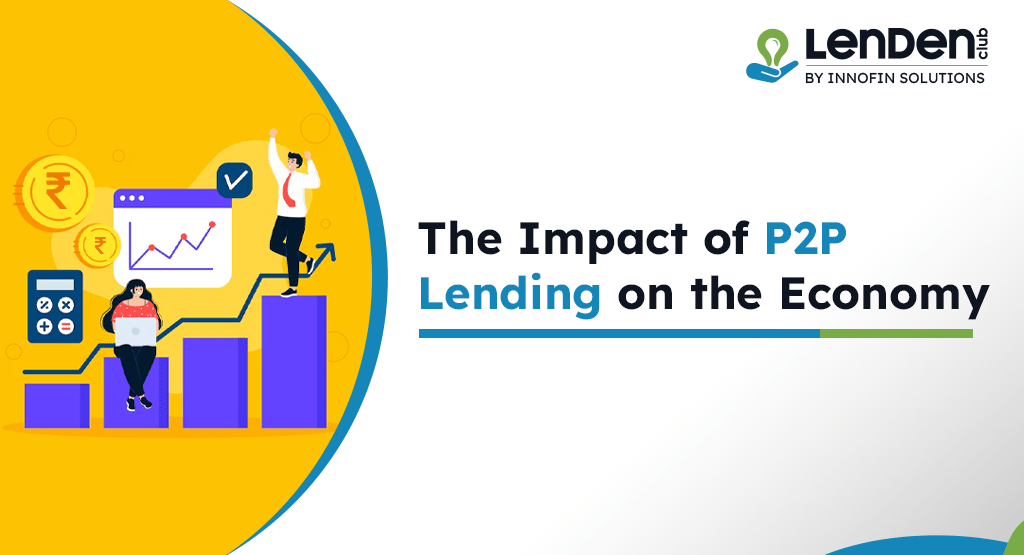Impact of P2P Lending on the Economy

Peer-to-peer (P2P) lending has emerged as a transformative force in the financial sector, redefining how individuals and businesses access credit. As the P2P lending industry grows, its impact on the economy becomes increasingly significant. Let’s explore how P2P lending is shaping economic landscapes worldwide.
How P2P Lending Expands Credit Access for Small Businesses and Startups
Probably, one of the most prominent contributions P2P lending brings is its democratizing of access to credit. Traditional financial institutions often set very rigid lending criteria that leave many small businesses, startups, and others with fewer or no credit histories underserved. P2P platforms therefore fill in the gap through lending to a more extensive spectrum of borrowers.
For example, a small entrepreneur with an idea but no collateral can fund it through P2P lending. Access empowers the individual and fuels entrepreneurial activities, creates jobs, and promotes economic growth. On top of that, most alternative credit assessment methods are used: analyzing payment patterns or checking social media data to give an idea about the borrower’s credibility.
Encouraging financial inclusion
P2P lending serves as a key tool in promoting financial inclusion. A large proportion of the population remains unbanked or underbanked in most developing economies, with little access to formal financial services. In this regard, P2P platforms offer alternatives that allow such individuals to get loans for education, healthcare, and other needs.
P2P lending, by extending financial services to underserved regions, helps local economies to grow, reduce the levels of poverty, and empower individuals to improve their quality of life. In the long term, it may lead to more sustainable economic development through a ripple effect of financial inclusion.
Maximizing Savings and Capital Growth Through P2P Lending
For the lenders, P2P gives a good option for capital deployment. As the interest rates on traditional savings accounts are often low, the yield offered by P2P lending makes this a very viable wealth-building option. Thus, it creates a situation where more and more money is allocated to generate better financial gains, hence facilitating capital formation in the economy.
P2P lending also allows lenders to diversify their financial portfolios. By lending to multiple borrowers across different sectors, lenders can reduce the risks involved while supporting a wide range of economic activities. This increased participation in lending activities mobilizes idle funds, driving economic growth.
How P2P Lending Improves Market Efficiency and Reduces Costs
The main advantage of P2P lending is to streamline the borrowing and lending process, making it very efficient. Traditional banking involves lengthy procedures, paperwork, and higher transaction costs compared with P2P platforms. A P2P platform connects borrowers and lenders through the use of technology, lowering overheads and ensuring a competitive interest rate.
This increased efficiency benefits both parties; borrowers get their funds quickly while lenders obtain higher earnings. The competition also creates pressure on traditional financial institutions to improve their services, thus creating a healthier financial ecosystem.
P2P Lending’s Role in Economic Recovery: A Post-Pandemic Solution
P2P lending has shown resilience to adjust during economic downturns, such as the COVID-19 pandemic. When a credit channel shrinks due to uncertainty, P2P platforms provided necessary liquidity.
P2P lending helps mitigate the economic impact of crises by allowing businesses to secure quick and flexible financing.
The Role of Fintech in P2P Lending: Innovations Reshaping Finance
The rise of P2P lending has driven significant advancements in financial technology (fintech). Platforms utilize sophisticated algorithms, machine learning, and data analytics to assess creditworthiness, detect fraud, and match borrowers with lenders. These technological innovations contribute to the broader fintech ecosystem.
As fintech grows, it creates new job opportunities and drives competition in the financial sector. The integration of technology in P2P lending also enhances
Regulatory Challenges in P2P Lending: Risks and Solutions
While the impact of P2P lending on the economy is largely positive, the industry is not without challenges. Issues such as default risks, lack of standardization, and potential misuse of platforms pose significant concerns. However, proactive regulatory measures can address these challenges.
In India, for example, the Reserve Bank of India (RBI) has introduced guidelines to regulate P2P lending platforms. These measures include setting lending caps, ensuring transparency, and mandating the use of escrow accounts for fund transfers. Such regulations enhance the credibility of P2P platforms, making them safer for participants and fostering greater trust in the system.
LenDenClub: A Case Study in Impact
LenDenClub—the largest P2P lending platform in India—can definitely be an example of bringing a positive influence upon an economy. LenDenClub, adhering to regulatory guidelines, has created an exemplary ecosystem for borrowers as well as lenders.
For borrowers, LenDenClub provides quick and hassle-free access to credit, enabling them to meet personal or business needs. For lenders, the platform offers an opportunity to earn attractive profits while diversifying their financial portfolios. Furthermore, LenDenClub’s emphasis on transparency and compliance has set a benchmark for the industry, encouraging responsible lending and borrowing practices.
Conclusion
The impact of P2P lending on the economy is multifaceted. By expanding access to credit, promoting financial inclusion, and driving technological innovation, P2P platforms are reshaping the financial landscape. Moreover, their ability to support economic recovery and enhance market efficiency underscores their significance in today’s economy.
As the industry continues to evolve, P2P lending can turn challenges into opportunities, benefiting borrowers, lenders, and the broader economy.
Team LenDenClub
LenDenClub is India’s largest alternate investment platform which started operations in India in 2015. We have been helping investors diversify their investments beyond traditional investment instruments ever since.